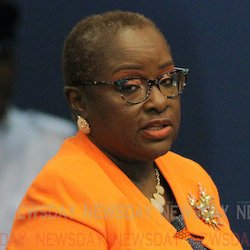Procurement Bill for House

THE Government will introduce changes to procurement legislation into the House of Representatives on Friday but already the move is raising questions. The Public Procurement and Disposal of Public Property (Amendment) Bill, 2020 is one of five bills on the order paper.
The Opposition recently abstained on Government’s Anti-Gang Bill - which needed a three-fifths special majority - demanding that it first fully enact the original Public Procurement and Disposal of Public Property Act 2015. This act remains partially proclaimed, and the regulations to enact it in detail still languish.
House Leader Camille Robinson-Regis on Tuesday confirmed to Newsday that the five bills will be introduced and be taken through all their stages.
“We’re assuming they will all pass. They are not anything difficult and they are all simple-majority bills.”
Asked if the procurement bill was a trade-off to win Opposition support for the Anti-Gang Bill, she said of the latter, “We can’t bring it (back) for another six months. We are moving forward with Government’s legislative agenda.”
Newsday was unable to contact Attorney General Faris Al-Rawi or UNC shadow AG Saddam Hosein.
Newsday’s reading of the bill is that it says nothing new as to when the 2015 act will be fully proclaimed, apart from repeating the act’s remark that proclamation will be done by the President.
Amcham CEO Nirad Tewarie on Tuesday told Newsday the bill will be discussed on Wednesday at a meeting of the Private Sector Civil Society Group. He showed Newsday a notice from January in which the group lamented non-implementation of the sct and non-proclamation of the regulations, while urging the sct not be changed regarding public-private partnerships (PPP) and government to government (G2G) transactions.
Activist Afra Raymond on Tuesday told Newsday that Parliament had passed the 2015 act with Opposition support, with two amendments, in 2016 and 2017 ,also passed by a special majority, all suggesting similar was now needed for the bill.
“There are conflicting views on the legality of amending this act via a simple majority,” he said.
Raymond supported the bill’s re-definition of bid-rigging as “collusive acts designed to unfairly influence the outcome of a competitive tender process.”
He lamented the bill (section 7(2)) would entirely remove G2G agreements from the oversight of the Office of Procurement Regulator (OPR) as “extremely detrimental,” given TT’s allegedly poor track record in these arrangements.
Raymond was concerned the bill will amend the act (section 7) to remove from OPR oversight over the state acquisition of any “legal services; financial services; accounting or audit services; medical services; or any other services as determined by the minister,” subject to Parliament’s negative resolution.
“These proposed amendments are detrimental in two ways - firstly, it appears entirely likely that PPPs would be re-labelled as a form of ‘financial services’ and therefore beyond the scope of OPR oversight.” Secondly, he asked how could an act dedicated to proper oversight of ‘Transactions in Public Money’ be changed to explicitly prevent the oversight of financial services. “The legal, financial services and accounting/audit functions are central to sound principles of good governance, so how can we agree to place those issues ‘out of bound’?”
Raymond said, “In my view these proposed amendments ‘hollow out’ the act, as they effectively remove G2G arrangements and PPP from OPR oversight. Asked if anything in the bill gave him assurance that the 2015 act will be fully proclaimed and enacted within a known time-frame, he said, “Of course with politicians, there are no assurances, only promises.”

Comments
"Procurement Bill for House"